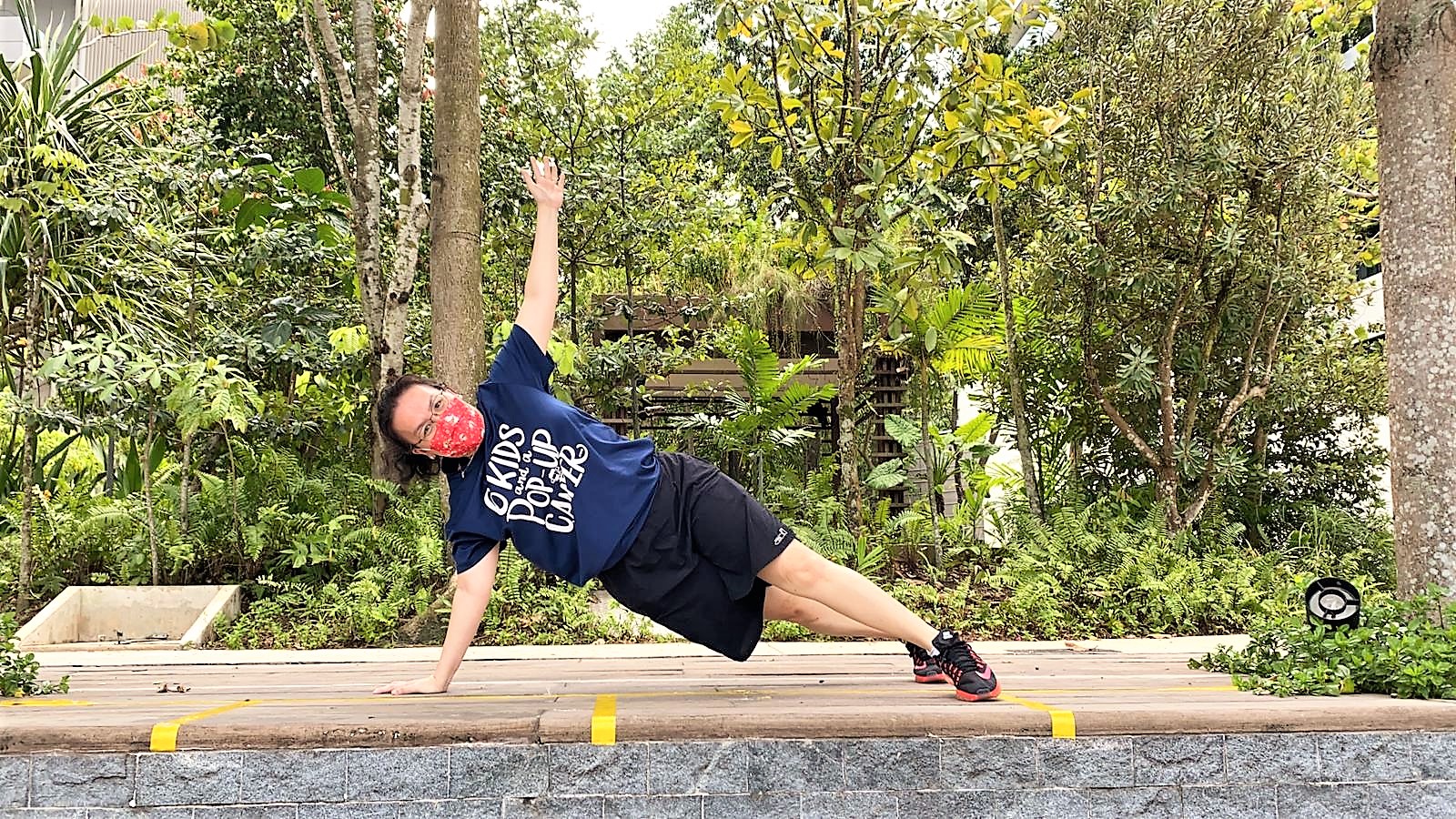
Working out is Ong Suwei's way of taking care of herself so she can better care for her seven children. Not a lover of exercise at first, the home-schooling mum can now work out with ease. Photo courtesy of Ong Suwei.
Being a mum is a 24/7 job and then some.
So it comes as no surprise that two in five mothers in a Focus on the Family Singapore survey released on April 30 say they have less than an hour a day to themselves.
Two in five mothers in a Focus on the Family Singapore survey say they have less than an hour a day to themselves.
The study involved nearly 1,000 mothers in Singapore.
More than a third (38%) did not manage to go out at least once in the last month with their friends without husbands and children in tow. This was not from want of a social circle because 82% of those surveyed said they had mum friends to support them in their journeys.
Despite the sacrifices, 84% said they enjoyed their roles as mothers.
They are not alone. The mums Salt&Light spoke to revelled in motherhood, too.
Said Ong Suwei, 46, who has seven children aged 21 months to 21 years: “The best part about being a mum is to be able to pour my life into my own children and grow them for the Lord’s use.
“I love the bond I have with each of my children that is so intimate and precious. I think the best part is my children love me unconditionally, too.”
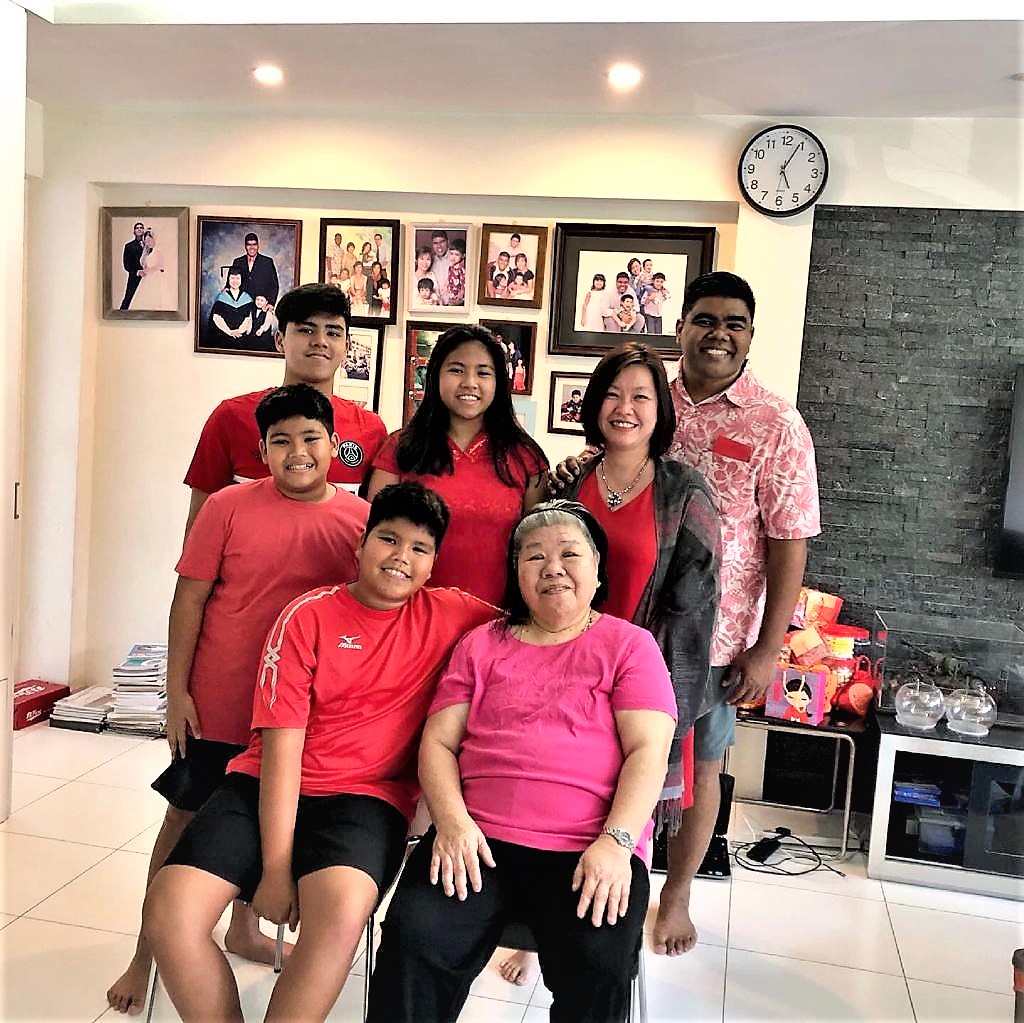
Charis Patrick (second from right) with her husband Patrick Elangovan (right), their four children and mother (seated). Once a self-confessed Tiger Mum, Charis has learnt to give her children space to grow into their potential. Photo courtesy of Charis Patrick.
Charis Patrick, 47, a mum to four children aged 11 to 18 said: “I really enjoy learning to see my children for who they are.
“If I am to be a good mum, I need to water my own garden or I can’t water my child’s garden.”
“I know all mums say this but I truly believe my children are awesome. I see such potential in them.
“I believe each child carries the blueprint of God in them and that, in their own timing and rhythm, they will blossom. My point of reference is this: How can I hold the space so they can be seen, heard and understood?”
But all four mums whom Salt&Light spoke to also underscored the importance of self-care.
“If I am to be a good mum, I need to water my own garden or I can’t water my child’s garden. I cannot give what I do not have,” said Eishen Serra, 33, mum to a five-year-old girl.
These are the self-care tips they shared.
1. Manage self-expectations
Charis learnt early on in motherhood to live and let live when it came to household chores.
Her family held out on hiring a domestic helper because they “didn’t believe in outsourcing parenting”.
“I wanted to spend time with the kids. So, I cannot let housework be a competition.”
So, even when she was heavily pregnant with baby number four, she still did the household chores.
“I’m not a perfectionist. I do what is necessary to get by. But even then, the housework was never-ending.
“I learnt to accept that the moment you have children, it’s not possible to have a house that is spick and span. I accepted that as a sign of motherhood. It means my children are having fun, they are allowed to explore.”
She also prepared simple meals that took less time.
“For a whole season, it was one meat, one veggie, no soup. If there was soup, then it was everything in the soup.”
She learnt to cook in bulk and freeze the extras for later in the week.
“I’m not very organised but I started to plan my meals.”
2. Get your priorities straight
What made lowering her expectations easier was Charis’ decision to focus on her relationship with her children.
“I wanted to spend time with the kids. So, I cannot let housework be a competition.
“If my husband asked, ‘Why is the house so messy?’ I would tell him that it was because the children were my priority.”
3. Be flexible
“Routine used to be so important to me. But I have learnt that it is equally important to be adaptable,” said Charis.
“If we are flustered when things don’t go our way, we give the children the message that things had better not go wrong.”
So, if she had planned to make bak kut teh (herbal pork soup) but could not find the right pork, then she would make ABC soup instead (carrot, potato and tomato soup so named because it contains Vitamins A, B and C).
This has enabled Charis to be less stressed out by things that do not go as planned and to set an example for her children.
“If we are flustered when things don’t go our way, we give the children the message that things had better not go wrong or it would be very scary and stressful.”
4. Don’t do it alone
Eishen moved to Singapore from the Philippines when she got married to her Singaporean husband. Apart from her husband, she has few family members to count on to help in childcare.
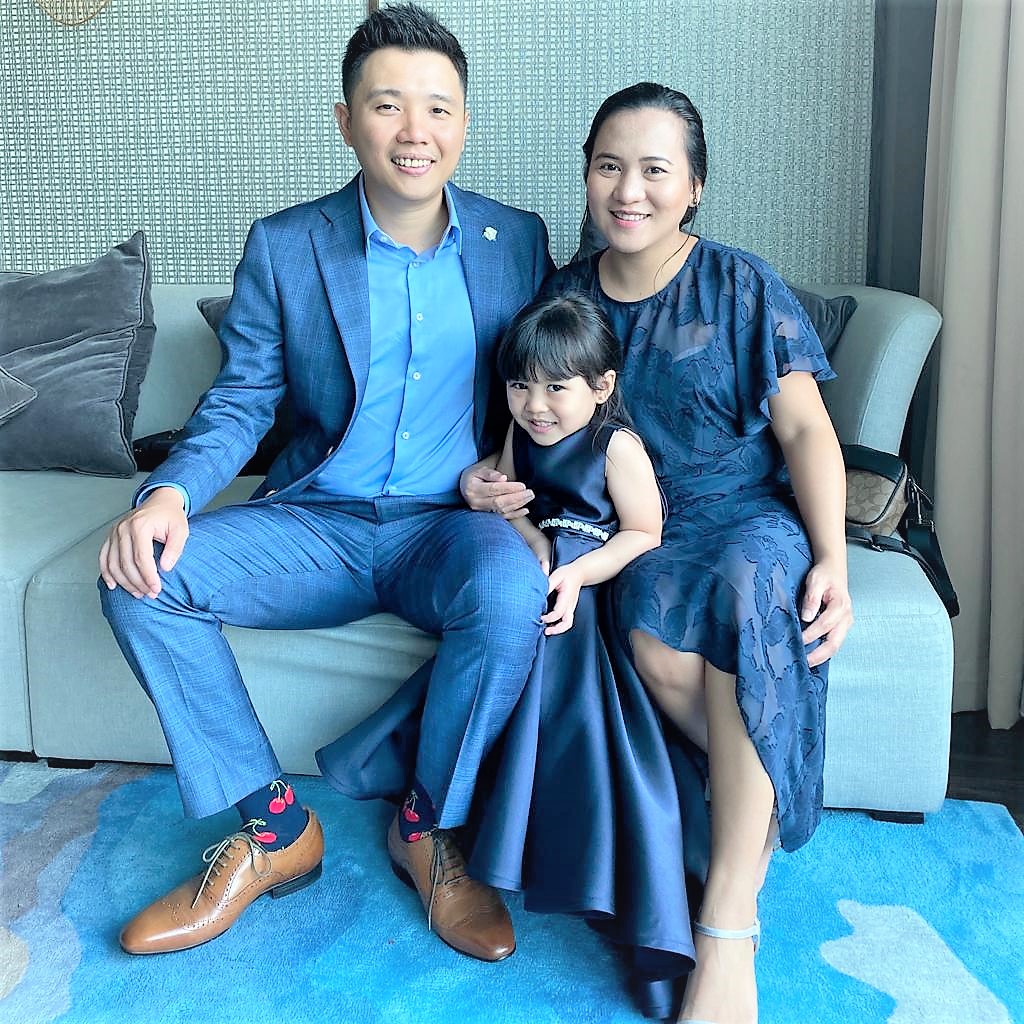
Eishen Serra (right) with her husband Jeremy Lee and their daughter. They named their child Meira which means “one who brings forth light” after receiving the name in a dream when they prayed about a name for their baby. Photo courtesy of Eishen Serra.
But since her daughter turned three and became more independent, the stay-home mum has been asking friends to babysit her child so she can have a night out with her husband.
“God’s heart is always that her well-being is taken care of.”
“I’m confident that I have equipped her with certain values to make age-appropriate decisions – what is good touch and bad touch, what is good stranger and bad stranger, what people are allowed to do (to her) and not allowed.”
Asking for help did not come easily for the first-time mum who was wracked with guilt in the beginning.
“I would wonder: What if something goes wrong and I’m not there? In time, I recognised the thoughts as ungodly thoughts, put them under the authority of Christ and replaced them with the truth.
“She is, first of all, God’s child. God’s heart is always that her well-being is taken care of. That helped me to release my guilt and worry to God.”
5. Know your body’s rhythms
Charis is an early riser. So, she plays to her body’s natural clock. “For many years, I have been waking up at 5am. I also sleep very early, by 10pm.”
That gives her the first hour of the day to herself before her family wakes up at six.
Since the Circuit Breaker in 2020, Sue has been establishing a healthier rhythm as part of her self-care. She has been working out.
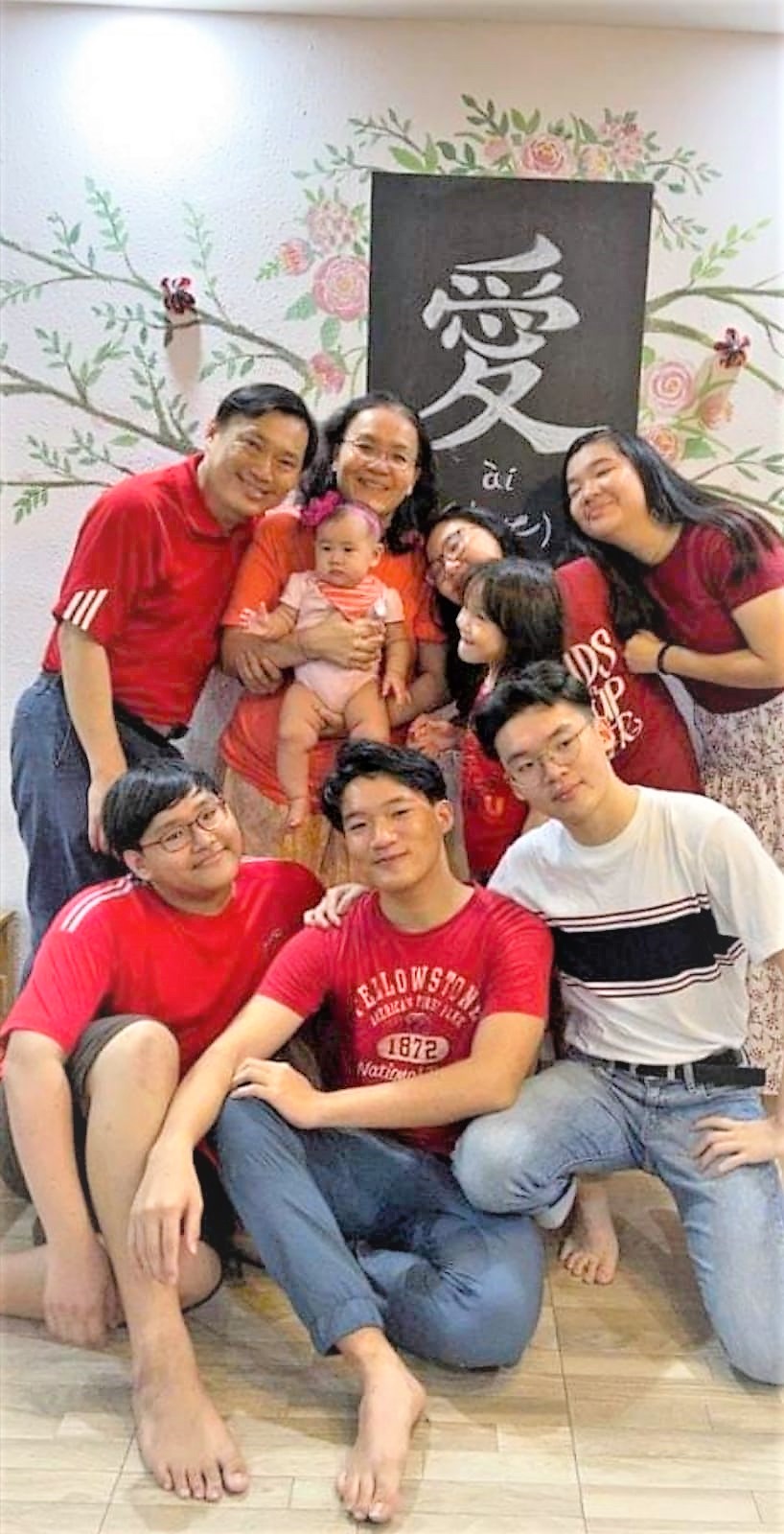
Ong Suwei (carrying her youngest child) with her husband Dan (left) and their seven children aged 21 months to 21 years. Though busy as a home-schooler, she resolved to spend time working out as part of her self-care routine. Photo courtesy of Ong Suwei.
“When I first started, I couldn’t do a single squat or push up or jumping jack. I’m glad to say that I can do these with more ease these days.
“When I first started planking, my tummy muscles were all quivering and I could hardly do a few seconds. Now, I can plank for a minute without shaking.
“Once I knew what I needed to rest, I could identify how often I needed the break.”
“Physical exercise was something I neglected for years and years because of multiple pregnancies and breastfeeding. I gave myself the excuse to not get sweaty.
“But now I see that it is important. I feel so much better being stronger.”
For Eishen, knowing her rhythm of rest has enabled her to get the reprieve she needed.
“In the beginning, there was a lot of guessing about why I was so tired. Then, I took an hour of stillness and quiet, and tuned in to my thoughts to discover what I needed.
“Once I knew what I needed to rest, I could identify how often I needed the break. Then, I could ask my husband for help.”
6. Flow with the seasons of motherhood
When Eishen first became a mother, most of her waking moments and much of her sleep time was taken over by her baby who would wake up every two hours in the first month of her life.
She never thought she would have time to herself again.
“Finding time to do what I liked and enjoyed gave me a burst of energy to do what I had to do as a mother.”
Then, as her daughter grew and slept better, she found herself still exhausted.
“I realised what I needed at that stage was to do something that I actually liked and enjoyed.”
So, she picked up watercolour painting and then calligraphy which she does for an hour every day after her child goes to bed.
“It was very strange. Finding time to do what I liked and enjoyed gave me a burst of energy to do what I had to do as a mother.
“It helped me have a mental break from being in my child’s world all the time.”
Now, she is excited to see what the other seasons of motherhood would bring her.
“I had always wanted to pursue the worship ministry. But then my baby came and she was needy.
Charis also worked with the different seasons of motherhood. She waited a decade before she returned to full-time work.
“I remember feeling very sad that my dream had to die. I remember grieving about it even though I was very happy and thankful to have my daughter.”
Then, she met a woman who was a mother of three and was also a worship leader and songwriter.
“God gave me a word of knowledge through her. She told me she had been in the Cry Room (for children in church) for six years taking care of her babies all the while knowing that she had been called to write songs and make music.
“But she told me that mothering was a necessary journey to bring her to that place. Motherhood was not a side track, not a diversion, not a disruption. It was a process to refine the vessel in her to carry the anointing that God was going to give her.
“That set me free to fully enjoy my mothering journey instead of resenting it and to embrace the new season of motherhood.”
“Self-care after becoming a mum looks different.”
Charis also worked with the different seasons of motherhood. She waited a decade before she returned to full-time work. Even so, she “struggled with a lot of guilt”.
She now works part-time as a psychotherapist in her own practice and calls it her sweet spot because it allows her time with her youngest who is 11.
“It’s about knowing why you do something, your priorities and your season in life.”
For Tabitha Tan, 33, who has a two-year-old daughter, in this season of her life self-care means “working on numerous projects or causes or on my bridal studio”.
“Self-care after becoming a mum looks different. We have less time so it’s more important than ever to do things that matter to us or allow us to feel like ourselves.”
7. Hang on to your gal pals
Gal pals are invaluable, maintained the mums. Friends who are mums can share their mothering experience.
Said Tabitha: “It’s a great support system. We alternate between bringing the kids together for play dates and having mum nights out where we eat dinner and hang out kid-free.
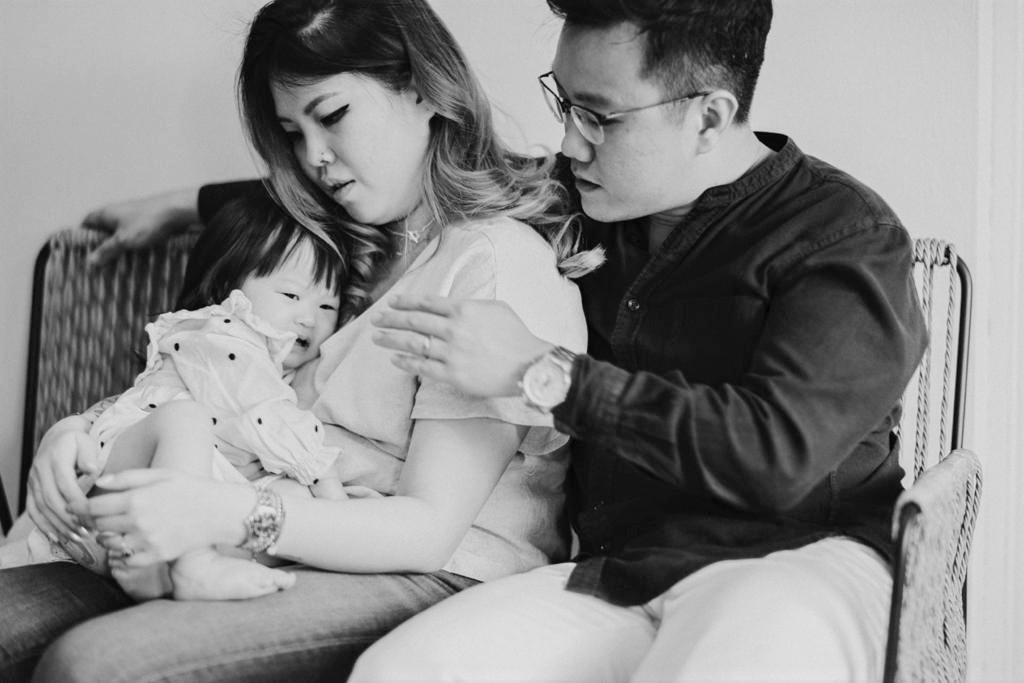
Tabitha Tan with her husband, Marc Wan, and their daughter, Olive Beth. Tabitha’s group of mum friends gives her a community in whom she can confide. Photo courtesy of Tabitha Tan.
“It’s a nice time to just enjoy each other’s company but also have common things to talk about – worries about not being a good mum, difficult situations at work, and to encourage each other through it all.”
Non-mum friends, Eishen found, can be roped in to lend a helping hand when needed. This is particularly necessary for her because she has no extended family in Singapore.
“It’s a nice time to just enjoy each other’s company but also have common things to talk about.”
“Three or four years into mothering, I realised I needed a social circle of my peers. I really hadn’t had time to build meaningful relationships with my peers.”
So, when her daughter became a toddler, Eishen made a greater effort to make friends. She reached out to mums of children her daughter befriended in the playground.
“I’ve come to see this as a way for me to evangelise as well because not everybody in the playground is a believer. This can be my mission field in this season of my life.”
She also reconnected with old friends.
“I had a friend whom I met on a mission trip many years ago. When I learnt that she had become a mother, it became a connecting point for me.
“I dropped her a message, ‘Congrats on your baby. I just saw on social media you gave birth. Let me know of any way I can help you. I know it’s been a while but I know what it’s like to be a mother. Let me know how I can help.’”
“I have a lovely community of friends on Facebook, sharing life and motherhood … Encouraging each other is meaningful.”
Eishen also started asking her husband to take over childcare for a day so she could go out with her friends.
The outings are not frequent. So she maintains the relationship in other ways.
“I intentionally text them at least once or twice a week. I ask them how I can pray for them because praying is one way to keep in touch.
“Sometimes, I text them and ask if I can drop by with some cookies I have just baked.
“It’s the small, intentional and sincere touches that help you keep in contact.”
With seven children, the youngest not yet two, Sue who home-schools her children relies on keeping in touch virtually as well.
“I have a lovely community of friends on Facebook, sharing life and motherhood and oftentimes our home-schooling journey. Encouraging each other is meaningful and fulfilling.”
8. Tap on God
Said Eishen: “My self-care always includes spending time with God. If I am going to be a mother after His will and to thrive in it, I need to be attuned to Him at every state because my spiritual state directly affects what happens to my physical and mental well-being.”
She admitted that, as a mum, she has had to adapt the way she spends time with God.
“When I was single, I could get an hour or two to spend with God. As a mother, there were days I didn’t know night from day.
“If I am going to be a mother after His will and to thrive in it, I need to be attuned to Him at every state.”
“So, I would listen to worship songs or podcasts or watch services online while I was breastfeeding. Only now that my child is older am I slowly able to have time to read the Word again.”
She did, however, learn to see God in the ordinary.
“Sometimes, when I am doing daily tasks like changing diapers, I get a revelation of how this is like the sacrificial love God has for us.
“It is an insight into God’s nurturing love for me.
“It shows me that even in those moments when I am weak, it is God who comes and meets me where I am.”
Charis uses the first hour of the morning before her family wakes to “connect to God”.
“I might go downstairs for a walk and listen to sermons or talk to God. Knowing how I want to spend the day, I would ask the Holy Spirit to lead and guide me, and glean from God’s wisdom.”
RELATED STORIES:
Here’s how to reassure your children that God is still faithful
Heartbreaking number seek help for kids with depression: Salt&Light Family Night
“Singaporeans need to learn to live with mess!”: 2017 Singaporean of the Year Dr Goh Wei Leong
We are an independent, non-profit organisation that relies on the generosity of our readers, such as yourself, to continue serving the kingdom. Every dollar donated goes directly back into our editorial coverage.
Would you consider partnering with us in our kingdom work by supporting us financially, either as a one-off donation, or a recurring pledge?
Support Salt&Light


